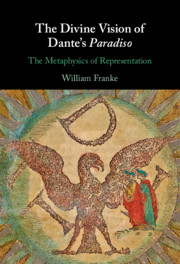Book contents
- The Divine Vision of Dante’s Paradiso
- The Divine Vision of Dante’s Paradiso
- Copyright page
- Contents
- Figures
- Prologue
- Acknowledgments
- Note on Translations and Primary Source Editions
- Part I The Literary Vision
- Chapter 1 Writing as Theophany: The Medium as Metaphor for Immediacy
- Chapter 2 The Presence of Speech in Writing: Speaking as Sparking
- Chapter 3 The Parts of Speech: Mediation and Contingency
- Chapter 4 From Speculative Grammar to Visual Spectacle and Beyond
- Chapter 5 Sense Made Sensuous and Synaesthesia in the Sight and Sound of Writing
- Chapter 6 Infinite Script: Endless Mediation as Metaphor for Divinity
- Part II Philosophical Reflections
- Appendix Paradiso XVIII. 70–136
- Index
Chapter 6 - Infinite Script: Endless Mediation as Metaphor for Divinity
from Part I - The Literary Vision
Published online by Cambridge University Press: 26 August 2021
- The Divine Vision of Dante’s Paradiso
- The Divine Vision of Dante’s Paradiso
- Copyright page
- Contents
- Figures
- Prologue
- Acknowledgments
- Note on Translations and Primary Source Editions
- Part I The Literary Vision
- Chapter 1 Writing as Theophany: The Medium as Metaphor for Immediacy
- Chapter 2 The Presence of Speech in Writing: Speaking as Sparking
- Chapter 3 The Parts of Speech: Mediation and Contingency
- Chapter 4 From Speculative Grammar to Visual Spectacle and Beyond
- Chapter 5 Sense Made Sensuous and Synaesthesia in the Sight and Sound of Writing
- Chapter 6 Infinite Script: Endless Mediation as Metaphor for Divinity
- Part II Philosophical Reflections
- Appendix Paradiso XVIII. 70–136
- Index
Summary
The grammatically analyzed mode in which language is presented in Dante’s written vision illustrates the proclivity of writing to shiver and splinter meaning. Writing tends to partition and fissure the presumed wholeness of sense as it occurs originally in oral communication and in the indivisible event of intuitive understanding. It is precisely the mechanical and material, the artificial and mediated aspects of language – particularly its grammatical composition out of differentiated and coordinated parts of speech – that become conspicuous in Dante’s inspired vision of the transcendent “speech” of Scripture.Astonishingly, this anatomization of writing is plied to mediate an authentically divine vision. Endless mediation of the whole by its parts, in Dante’s vision of language, provides a plausible image of the infinity and eternity of God. Yet Dante’s deconstructive vision of writing anatomized into its parts and even disintegrating into apparent chaos opens a vista driving beyond the visible altogether. If the vision of God is presented concretely in the infinite mediations of language that Dante places on display, the logic of writing (écriture) is to dis-identify the object of the vision with anything positively given. Only the differences created by representation open a perspective upon the unmediated and the unrepresentable. Realizing an apophatic logic of ineffability, Dante claims an immediate vision of divinity in what these mediations are not – in the Im-mediate. He gives us an immediate vision of the divine Word in Scripture but dissolves it, then, into infinite mediation, leaving us oriented to the source of synthesis of the endless mediations in which our existence consists.
Keywords
- Type
- Chapter
- Information
- The Divine Vision of Dante's ParadisoThe Metaphysics of Representation, pp. 180 - 188Publisher: Cambridge University PressPrint publication year: 2021

